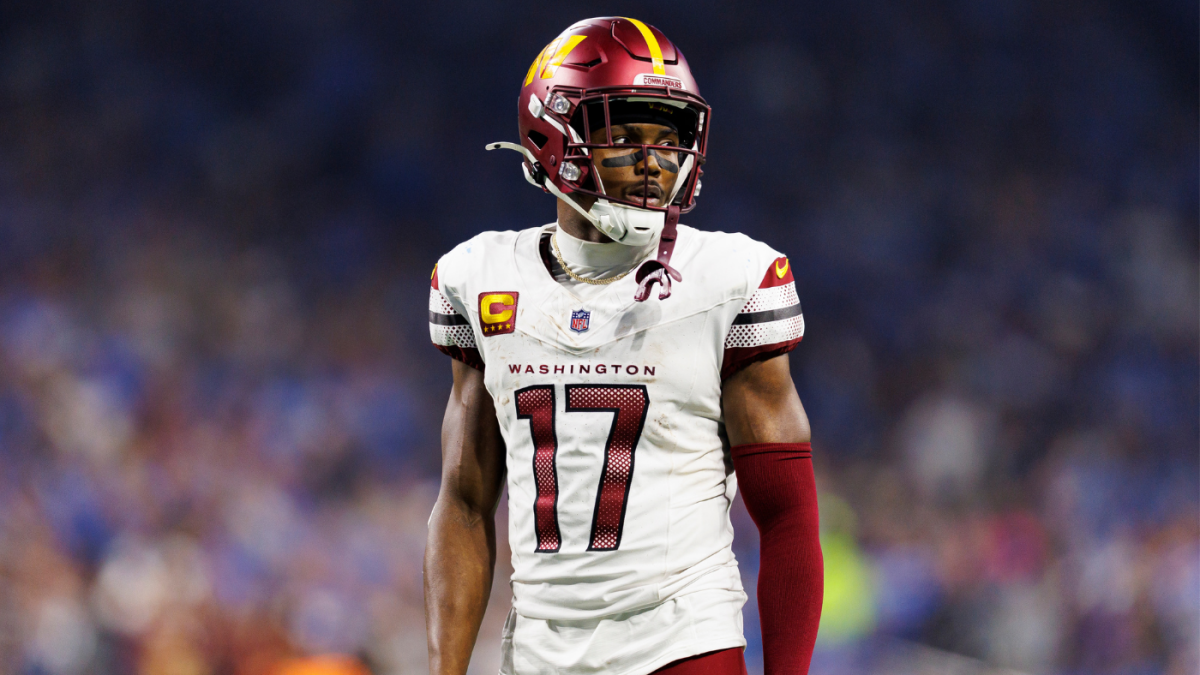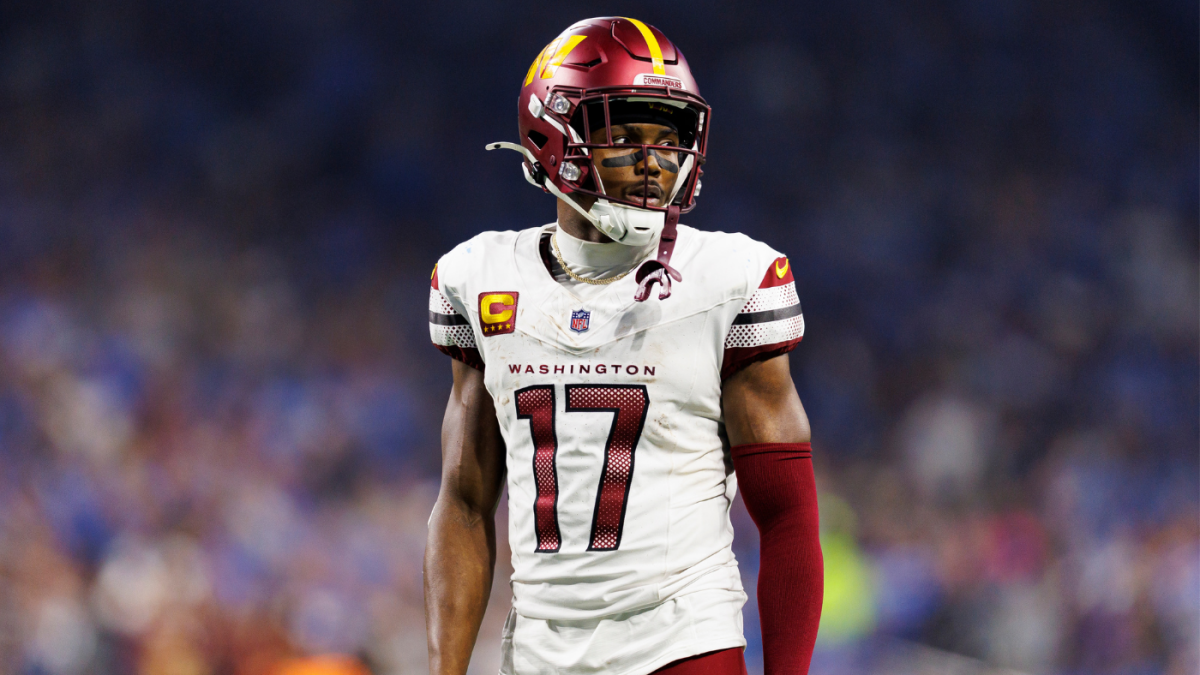The Terry McLaurin Contract Saga: A Deep Dive into the 2025 Commanders Training Camp Holdout
The Seeds of Discontent: Why McLaurin Held Out
The summer of 2025 was marked by a familiar yet tense scenario in the NFL: a star player holding out from training camp in pursuit of a new contract. This time, the spotlight was on Terry McLaurin, the Washington Commanders’ Pro Bowl wide receiver. McLaurin’s absence from training camp cast a shadow over the team’s preparations, sparking debates about his future with the franchise and the potential impact on the Commanders’ upcoming season. The roots of this holdout were deeply embedded in a complex web of financial disagreements, market trends, and organizational uncertainties.
McLaurin’s decision to hold out was not impulsive but rather a calculated move driven by a fundamental disagreement over his contract’s value. As a consistently high-performing receiver and a respected leader in the Commanders’ locker room, McLaurin believed he deserved a contract that reflected his contributions to the team. However, negotiations between his representatives and the Commanders’ front office had reached a stalemate, with significant gaps in financial terms and contract structure.
Several factors contributed to this impasse. Firstly, the wide receiver market had undergone a seismic shift in recent years, with players like Tyreek Hill and Davante Adams signing record-breaking deals that reset the position’s pay scale. McLaurin, who had consistently delivered top-tier performances, naturally sought a contract that placed him among the league’s highest-paid receivers. This expectation was not merely about personal gain but a reflection of his production and importance to the Commanders’ offense.
Secondly, the Commanders’ ownership situation added a layer of complexity to the negotiations. With ongoing uncertainties surrounding the team’s ownership and potential sale, the front office might have been hesitant to commit significant long-term financial resources to any single player. This hesitancy could have led to a more conservative approach in negotiations with McLaurin, further widening the gap between the two sides.
Finally, the lack of guaranteed money beyond the 2025 season for several Commanders players might have fueled McLaurin’s decision. As the team’s top receiver and a key offensive weapon, McLaurin likely sought assurances that his future with the team was secure. A contract with substantial guaranteed money would have provided that security, ensuring that his contributions were valued and his future with the Commanders was stable.
The Impact of McLaurin’s Absence: A Void on the Field and in the Locker Room
McLaurin’s holdout had a profound impact on the Commanders’ training camp, both on and off the field. His absence left a noticeable void in the team’s receiving corps, forcing younger and less experienced players to step into larger roles. While this provided an opportunity for these players to showcase their talents, it also hindered the development of the Commanders’ offense as a whole. The absence of a proven playmaker like McLaurin meant that the offense had to rely on unproven talent, potentially impacting the team’s readiness for the regular season.
McLaurin’s connection with the team’s quarterback, Carson Wentz, was crucial for the Commanders’ offensive success. Without McLaurin on the field, Wentz had fewer opportunities to build rapport with his primary target, potentially impacting the team’s passing game in the regular season. The chemistry between a quarterback and his top receiver is often the backbone of a successful offense, and McLaurin’s absence disrupted this dynamic.
Beyond the on-field impact, McLaurin’s absence also affected the team’s morale and leadership dynamic. As a respected veteran and team captain, McLaurin’s presence was vital for setting the tone in the locker room and providing guidance to younger players. His holdout created uncertainty and speculation, potentially disrupting the team’s focus and cohesion. The locker room is a delicate ecosystem, and the absence of a key leader like McLaurin could have ripple effects on the team’s overall performance and camaraderie.
The Stance of Each Side: A Battle of Wills
The McLaurin contract saga was a classic example of a battle of wills, pitting the player’s desire for fair compensation against the team’s need to manage its salary cap effectively. McLaurin’s camp likely argued that his performance, leadership, and value to the Commanders’ offense justified a top-tier contract. They may have pointed to his consistent production, his ability to make contested catches, and his reputation as a hard worker and team player. McLaurin’s representatives likely emphasized his importance to the team’s success and the need for the Commanders to invest in their star player to maintain competitiveness.
On the other hand, the Commanders’ front office likely emphasized the need to balance McLaurin’s contract with the team’s overall financial health. They may have argued that while McLaurin was a valuable player, they couldn’t afford to overpay him at the expense of other roster needs. The team also had to consider the potential long-term implications of a large contract, particularly given the uncertainties surrounding the team’s ownership. The front office’s stance was likely driven by a desire to maintain financial flexibility, allowing the team to address other areas of need and build a well-rounded roster.
The standoff between McLaurin and the Commanders was a delicate balancing act, requiring both sides to make concessions to reach a mutually agreeable solution. Failure to do so risked damaging the relationship between the player and the team, potentially leading to a trade or free agency departure down the line. The negotiations were not just about money but also about trust, respect, and the long-term vision for the franchise.
Von Miller’s Presence: A Defensive Spark Amidst Contractual Drama
Amidst the McLaurin contract drama, the Commanders’ training camp also saw the presence of veteran pass rusher Von Miller. Miller’s arrival brought a spark to the team’s defense, as he showcased his ability to still get after the quarterback. His presence provided a positive distraction from the McLaurin situation, giving fans and coaches alike something to be excited about. Miller’s experience and leadership were also valuable assets for the Commanders’ defense. He served as a mentor to younger players, helping them develop their skills and understand the nuances of the game. His presence elevated the overall performance of the defense, making them a more formidable unit heading into the regular season.
However, Miller’s arrival could not completely overshadow the McLaurin contract saga. While his presence boosted the team’s morale and defensive capabilities, the uncertainty surrounding McLaurin’s future remained a significant concern. The Commanders’ defense could only do so much to compensate for the absence of their top receiver. The offense’s struggles without McLaurin highlighted the importance of having a balanced roster, with both offense and defense contributing to the team’s success.
The Resolution: A Sigh of Relief for Commanders Fans
After several days of tense negotiations and growing uncertainty, the McLaurin contract saga finally came to an end. The Commanders and McLaurin reached an agreement on a new long-term contract, ensuring that he would remain in Washington for the foreseeable future. The details of the contract were not immediately disclosed, but it was widely reported that McLaurin received a significant raise and a substantial amount of guaranteed money. The agreement was met with relief and excitement by Commanders fans, who were eager to see their star receiver back on the field.
McLaurin reported to training camp shortly after the agreement was reached, putting an end to his holdout and allowing him to rejoin his teammates. His return provided a boost to the team’s morale and offensive capabilities, setting the stage for a more productive training camp and a more promising season. The resolution of the contract saga was a testament to the power of negotiation and compromise, with both sides ultimately finding a solution that worked for them.
Conclusion: A Lesson in Negotiation and the Value of Star Power
The Terry McLaurin contract saga served as a reminder of the complexities of NFL contract negotiations and the importance of star players to their respective teams. McLaurin’s holdout demonstrated his value to the Commanders and his willingness to stand up for what he believed he deserved. The Commanders’ eventual agreement to a new contract underscored the team’s recognition of McLaurin’s importance to their success.
The saga also highlighted the challenges of managing a team’s salary cap while trying to retain key players. The Commanders had to balance McLaurin’s demands with the needs of the rest of the roster, ultimately finding a solution that satisfied both parties. The resolution of the contract saga was a valuable lesson in negotiation, compromise, and the enduring power of star players in the NFL. It demonstrated that while financial considerations are important, the intangible value of a star player’s leadership, production, and impact on the team’s culture cannot be overlooked. In the end, the McLaurin contract saga had a positive resolution, with both the player and the team benefiting from the outcome. McLaurin secured his financial future and reaffirmed his commitment to the Commanders, while the team retained its top receiver and a valuable leader in the locker room. The saga served as a valuable lesson in negotiation, compromise, and the enduring power of star players in the NFL.












